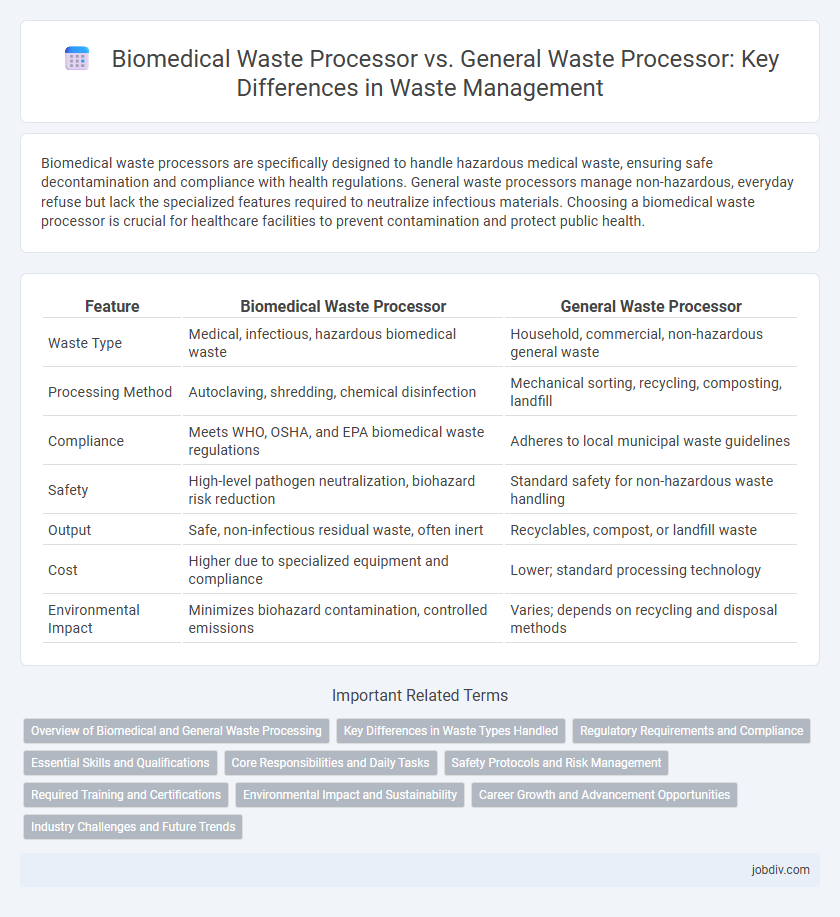Biomedical waste processors are specifically designed to handle hazardous medical waste, ensuring safe decontamination and compliance with health regulations. General waste processors manage non-hazardous, everyday refuse but lack the specialized features required to neutralize infectious materials. Choosing a biomedical waste processor is crucial for healthcare facilities to prevent contamination and protect public health.
Table of Comparison
| Feature | Biomedical Waste Processor | General Waste Processor |
|---|---|---|
| Waste Type | Medical, infectious, hazardous biomedical waste | Household, commercial, non-hazardous general waste |
| Processing Method | Autoclaving, shredding, chemical disinfection | Mechanical sorting, recycling, composting, landfill |
| Compliance | Meets WHO, OSHA, and EPA biomedical waste regulations | Adheres to local municipal waste guidelines |
| Safety | High-level pathogen neutralization, biohazard risk reduction | Standard safety for non-hazardous waste handling |
| Output | Safe, non-infectious residual waste, often inert | Recyclables, compost, or landfill waste |
| Cost | Higher due to specialized equipment and compliance | Lower; standard processing technology |
| Environmental Impact | Minimizes biohazard contamination, controlled emissions | Varies; depends on recycling and disposal methods |
Overview of Biomedical and General Waste Processing
Biomedical waste processors specialize in treating hazardous medical waste, using methods such as autoclaving, incineration, and chemical disinfection to neutralize infectious agents and ensure compliance with health regulations. General waste processors handle common municipal solid waste, employing techniques like mechanical sorting, composting, recycling, and landfilling to manage non-hazardous refuse. Effective processing of both waste types is crucial to minimize environmental impact, protect public health, and promote sustainable waste management practices.
Key Differences in Waste Types Handled
Biomedical waste processors handle hazardous medical waste such as blood, contaminated sharps, and pathological waste, requiring specialized treatment to prevent infection and environmental contamination. General waste processors manage non-hazardous waste including household trash, packaging, and organic refuse, focusing on volume reduction and recycling. The key difference lies in the risk level and regulatory requirements, with biomedical waste demanding strict compliance to health safety standards.
Regulatory Requirements and Compliance
Biomedical waste processors must adhere to stringent regulatory requirements such as the Biomedical Waste Management Rules, 2016, which mandate specific segregation, treatment, and disposal standards to prevent health hazards and environmental contamination. General waste processors follow broader municipal waste regulations like the Solid Waste Management Rules, 2016, which are less rigorous and focus primarily on recycling and landfill management. Compliance for biomedical waste involves frequent audits, specialized training, and detailed documentation, while general waste processors face comparatively flexible regulatory oversight.
Essential Skills and Qualifications
Biomedical waste processors require specialized knowledge in handling infectious materials, understanding biohazard safety protocols, and training in regulatory compliance such as OSHA and WHO guidelines. General waste processors need skills in sorting, recycling processes, and operational efficiency with certifications like waste management safety or environmental health standards. Both roles demand attention to detail and physical stamina, but biomedical waste processing emphasizes medical waste handling and contamination prevention expertise.
Core Responsibilities and Daily Tasks
Biomedical waste processors specialize in safely handling, segregating, and treating infectious and hazardous medical waste to prevent contamination and ensure regulatory compliance. General waste processors manage a broader range of non-hazardous materials, focusing on collection, sorting, recycling, and disposal of everyday solid waste. Daily tasks for biomedical processors include sterilizing sharps and biohazardous materials, while general processors prioritize waste separation and landfill management.
Safety Protocols and Risk Management
Biomedical waste processors implement stringent safety protocols including biohazard containment, sterilization through autoclaving, and compliance with WHO guidelines to mitigate risks of infection and contamination. General waste processors prioritize broader risk management methods such as segregation, recycling, and chemical treatment but lack specialized procedures for hazardous medical waste. Effective management of biomedical waste requires advanced safety measures distinct from those used in general waste processing to protect healthcare workers and the environment.
Required Training and Certifications
Biomedical waste processors require specialized training in hazardous waste handling, infection control, and compliance with health regulations such as OSHA and EPA standards. Certifications like the Certified Biomedical Waste Manager (CBWM) ensure proper knowledge of biohazard disposal protocols, whereas general waste processors typically require basic training in municipal waste management and environmental safety. Proper certification in biomedical waste processing minimizes health risks and legal liabilities associated with infectious waste.
Environmental Impact and Sustainability
Biomedical waste processors are designed to safely treat infectious and hazardous materials, significantly reducing the risk of environmental contamination and spreading diseases. General waste processors handle a diverse range of non-hazardous materials, emphasizing volume reduction and recycling but lacking the specific treatment needed for biomedical waste. Investing in specialized biomedical waste processing technology enhances sustainability by ensuring proper disposal, minimizing soil and water pollution, and protecting ecosystem health.
Career Growth and Advancement Opportunities
Careers in biomedical waste processing offer specialized growth opportunities in healthcare compliance, biohazard management, and regulatory standards, making professionals highly sought after in hospitals and research facilities. General waste processors experience broader advancement paths in municipal services, recycling operations, and environmental management with potential roles in sustainability initiatives. Expertise in biomedical waste handling commands higher certifications and specialized training, enhancing prospects for leadership positions within medical waste treatment companies.
Industry Challenges and Future Trends
Biomedical waste processors face stringent regulatory compliance and require specialized technology to safely handle infectious and hazardous materials, contrasting with general waste processors that manage less complex waste streams. Industry challenges include high operational costs, the need for real-time monitoring, and adapting to evolving environmental standards, driving innovation toward automation and eco-friendly disposal methods. Future trends emphasize integration of AI-powered sorting systems, enhanced sterilization techniques, and circular economy principles to minimize environmental impact and maximize resource recovery in both biomedical and general waste sectors.
Biomedical Waste Processor vs General Waste Processor Infographic

 jobdiv.com
jobdiv.com